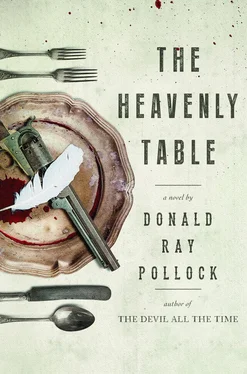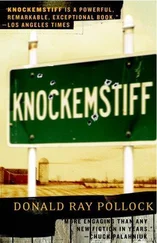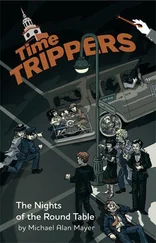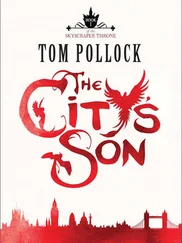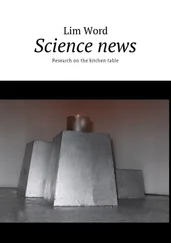“Sir?” Malone said. “The Majestic? I’m not sure I’m following.”
“My wife’s in town this week and insisted on going there last night. I’ll tell you what, Sergeant, I’m still not recovered from it. The worst excuse for entertainment I ever saw in my life.”
“Yes, sir.”
“So you don’t think this Jewett had anything to do with what happened to Bovard?”
“No, I think the barkeep tried to pull something on him like he did with the lieutenant, but the boy got the jump on him.”
“And no sign of the other two?”
“No, sir.”
“Well, it’s late,” Fisher said. “Maybe we better let someone else figure out how to proceed. From what I’ve read about them in the papers, he’s sure to hang regardless, isn’t he?”
“I expect so.”
Fisher yawned and stretched. “Good work, Sergeant. Good work.”
“Thank you, sir,” Malone said. He waited until the captain left, then went inside the infirmary and sat down in the hallway to wait and see how things turned out with the lieutenant. The man had damn near cried when he heard they might not get to the war for another five or six months, and then this morning, contrary to the rumors that had been circulating, Malone had found out that the 343rd would be shipping out for France sometime in November. Now the poor sonofabitch would never know what war felt like. Then again, maybe he already did; the day or so he spent chained in that maniac’s back room was probably as close to being horrific as anything he would have ever seen at the Front. The sergeant took another sip of the cold coffee, thought about all the men who’d voluntarily shot off their fingers and toes trying to get out of it.
An hour later, an orderly pushed Bovard out of the operating theater on a gurney and down the hall to a room. Eisner, the clap doctor, came out a minute or two later, and Malone asked him about the lieutenant’s condition. “Well, he’s suffered a serious shock, and there wasn’t anything to be done about the hand or the ear, but from what I’ve heard, it could have been a lot worse. My biggest concern is the risk of infection. A tavern is one of the worst places in the world for germs. Which reminds me, have you and your men washed up since you left that filthy hole?”
“Uh, well, we haven’t had—”
“I don’t understand you people,” Eisner said angrily. “Good hygiene is one of the most important keys to a long and happy life, and yet you refuse to embrace it.” Then he turned and stomped out of the building.
Malone walked down to the room where they’d taken Bovard. He stood in the doorway and looked in. A soft light burned in the far corner. Wesley Franks was sitting in a metal chair beside the lieutenant’s bed. He was talking softly to him and dabbing his forehead with a damp cloth. “Has he said anything?” Malone asked.
“No, sir,” Wesley said. “They got him knocked out.”
Malone stepped into the room, moved up closer to the bed. The stub of Bovard’s left hand was wrapped with gauze, and another bandage covered his ear hole. A bit of bloody cotton was sticking out of the corner of his mouth. “Well, at least it wasn’t his right.”
“Sir?” Wesley said, squinting at the sergeant with his good eye.
“His hand. He’s right-handed, from what I remember.”
“Oh,” Wesley said. He dipped the cloth in a pan of water, then squeezed the excess out of it. “Do you think he’ll still be able to stay in the army, sir?”
Malone shook his head. “It’s doubtful.”
“That’s a shame,” Wesley said.
“Maybe,” Malone said, “maybe not. What if he went over there and got himself killed? At least this way he’s still walkin’ around on top of the ground.”
“Well…”
“Just like you, Franks. That Dear John letter you got may have saved your life in the long run.”
Wesley shook his head. He had been thinking a lot about what his shameful return home was going to be like; and he’d spent all day wishing he could just stay here in the infirmary forever. “I don’t know, sir,” he said to the sergeant. “I guess that all depends on what you think it’s worth.”
CHESTER HIGGENBOTHAM HEARD the noise and sat up. It sounded as if someone was trying to jimmy the front door. The news that the stable would soon be converted into a garage still had him down, and this afternoon, as soon as Hog handed him his week’s pay, he had headed for the Mecca Bar to drown his sorrows. He had passed out in the straw before sundown, and though it was now past midnight, he still felt a little drunk. He heard the noise again. “Shit,” he said under his breath. In return for his six dollars a week and somewhere to sleep, he took care of the animals and cleaned out the stalls and kept an eye on the place at night. He picked up his squirrel rifle. As he stepped out the back door, he heard clamoring coming from uptown, men shouting and car engines roaring and a gunshot or two. Lord, some fools must be having a high ol’ time tonight, he thought. Maybe everybody in the goddamn county’s losing their job.
Slipping quietly around the side of the building, Chester saw a dark shape at the door, obviously prying on the lock. He called out, and when the man turned and started to run, he lifted his rifle and fired once without really aiming, regretting it as soon as he pulled the trigger. You dumb bastard, he berated himself. He’d been on a toot when he committed the stupid crimes that got him sent to Mansfield, and now here he was again, half drunk and shooting at somebody. Although prison was where he had learned to take care of horses, he’d vowed the day of his release that he’d kill himself before he ever went back. That’s what worried him most about the stable shutting down. It was all he’d done for the past thirty years, but the job had kept him out of trouble. True, it hadn’t been much of a life, but he’d seen the last time he was locked up what the young ones did to men his age, forcing them to kneel down like a supplicant beside some hoodlum’s bunk and gently knead his wang and blow little kisses on the head of it while the sonofabitch dreamed of some woman on the outside. No, he had it damn good compared to that. And, hell, you never knew, maybe Hog would change his mind about working on automobiles. So when he saw the man keep going, Chester breathed a sigh of relief and wished him luck, then went back inside the barn to finish sleeping off his debacle.
The bullet, however, didn’t just fly into the air aimlessly, as the stable bum thought. Getting hold of his horse had been the only plan Cane could think of when he left Jasper’s house. With the gangs of men roaming the streets, fired up on liquor and rumors and false sightings and the chance at reward money, it had taken him over an hour to sneak and dodge and crawl to the stables where he and Cob had left their rides three days ago. He was still trying to pry the hasp off the door with the barrel of Cob’s pistol when he heard Chester yell; and he didn’t get more than a few feet before the bullet knocked him sideways, tearing the hell out of his right kidney before lodging in his stomach wall. Stifling a cry, he kept going.
He ran on until he came to the iron railway trestle extending over the Scioto. He stumbled across it in the dark, then jogged north a mile or so along the tracks with his hand pressed against the rip in his side. By then, his new shirt and coat were soaked with blood. He stopped and pulled some paper currency out of the saddlebag and tried to staunch the wound with it. Then he walked on, panting raggedly. Three miles out of town, a freight train barreled past him; and he would have gladly given all the money he had ever stolen for one third-class ticket away from here. He managed to go a few more yards before he collapsed in a heap.
Читать дальше
